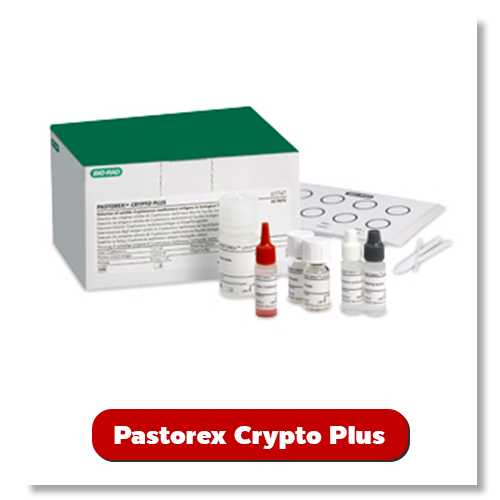
Pastorex Crypto Plus
Pastorex Crypto Plus is a latex agglutination test designed for the qualitative and semi-quantitative detection of the capsular polysaccharide of Cryptococcus neoformans (glycuronoxylomannan) in serum, CSF, BAL and urine.
Cryptococcosis is an opportunistic infection that occurs in patients who are immunodeficient, most notably those with AIDS. The infection disseminates rapidly to the central nervous system (meninges) and other organs after a pulmonary primary phase. Soluble antigens become rapidly detectable in biological fluids.

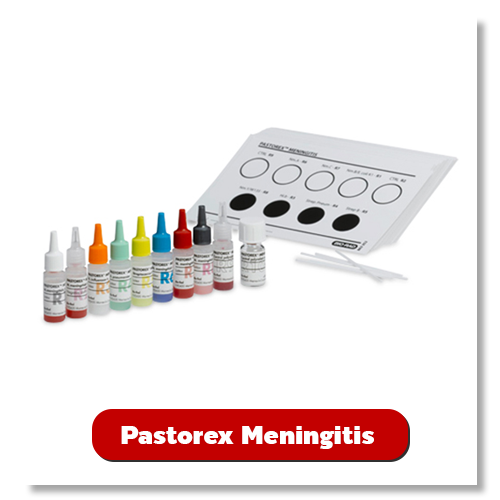
Pastorex Meningitis
Pastorex Meningitis assay is an agglutination test intended for the rapid diagnosis of bacterial meningitis by:
The qualitative detection of soluble antigens to Neisseria meningitidis groups A, B/E. coli K1, C, Y/W135, Haemophilus influenzae type b, Streptococcus pneumoniae and group B Streptococcus, in cerebrospinal fluid and blood cultures;
The identification of Neisseria meningitidis groups A, B/E. coli K1 and C; Haemophilus influenzae type b, Streptococcus pneumoniae, and group B Streptococcus from suspected colonies isolated on agar culture media.
Key Benefits
Accurate identification of more than 85% of bacteria responsible for meningitis
Differential identification of each Neisseria serogroup, in particular N. meningitidis A and N. meningitidis C for an accurate epidemiology and vaccination especially in case of outbreaks
Direct assay from cerebrospinal fluid specimen and blood cultures (after sample preparation)
Bacterial grouping directly from fresh isolated colonies
Complete kit: Latex reagents, negative and positive controls with color-coded cap, disposable agglutination cards (identified with distribution pattern) and sticks
7 latex reagents of different colors specific for each bacteria, both negative and positive controls; available in individual dropper bottles as well for maximum flexibility
Agglutination card with distribution pattern, white and black circles to enhance the different colored clumps observation
Principle
Pastorex Meningitis assay is based on latex particle agglutination using visual interpretation. Polysaccharide antigens specific to the bacteria responsible for meningitis are detected using colored latex particles coated with strain-specific antibodies. Reaction in the presence of these specific antigens results in visible colored clumping of latex particles. In the absence of antigens, the latex particles remain in a homogenous suspension.

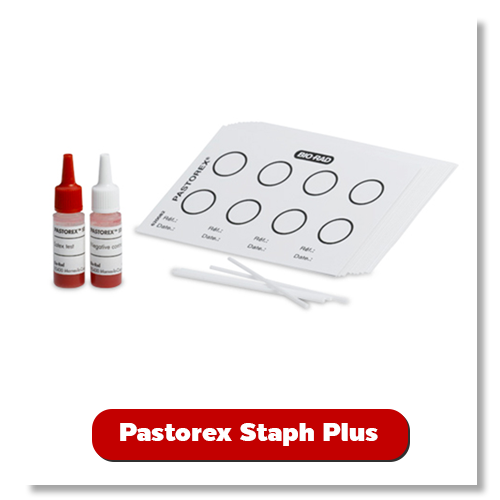
Pastorex Staph Plus
Pastorex Staph Plus is a rapid agglutination test for the simultaneous detection of the fibrinogen affinity antigen (clumping factor), protein A, and the capsular polysaccharides of Staphylococcus aureus. The kit includes the control, disposable cards and sticks.


Pastorex Strep
Pastorex Strep Kits are a family of rapid, sensitive agglutination tests providing identification of β-hemolytic streptococci belonging to Lancefield groups A, B, C, D, F and G. Identification is based on the type of hemolysis (β-hemolytic) surrounding colonies grown on blood agar and on the detection of group-specific polyoside antigens in the cell wall. The polyoside antigens are extracted from the cell wall and their presence demonstrated using latex particles coated with homologous antibodies.
1.Color-coded vial caps
2.Choice of two extraction temperatures:
-15 minutes at room temperature
-10 minutes at 37°C
3.Bichromatic agglutination:
-Positive: red agglutination reaction on green background
-Negative: homogenous brown suspension

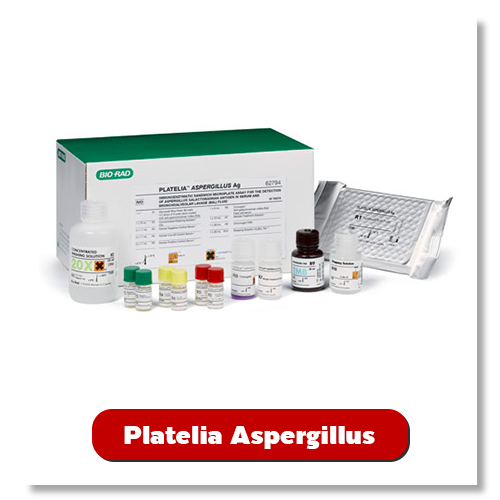
Platelia Aspergillus
Aspergillus species are known to release exo-antigens during growth: low levels of the circulating galactomannan antigen are detected in biological fluids of patients with invasive aspergillosis
The sandwich ELISA Platelia Aspergillus Ag can detect 1ng of galactomanann antigen per ml of serum, enabling the diagnosis of invasive aspergillosis at early stage of the disease often before the onset of clinical signs and radiological abnormalities.
This method is integrated into the EORTC-MSG criteria of definition and classification of invasive aspergillosis.
Platelia Aspergillus Ag assay enables the detection of the circulating Aspergillus galactomannan antigen in adult and pediatric serum samples as well as in adult bronchoalveolar lavage (BAL) fluid samples.
Platelia Aspergillus Ag reagents are ready to use and their formulations comply with the recent international mercury regulations.
Platelia Aspergillus IgG assay is an indirect microplate immuno-enzymatic assay for the detection of anti-Aspergillus IgG antibodies in human serum or plasma.
A unique assay designed with a recombinant purified Aspergillus antigen, this highly sensitive and specific test is anappropriate diagnostic tool for the detection of anti-Aspergillus IgG in immuno-competent patients suffering from variousforms of chronic aspergillosis.

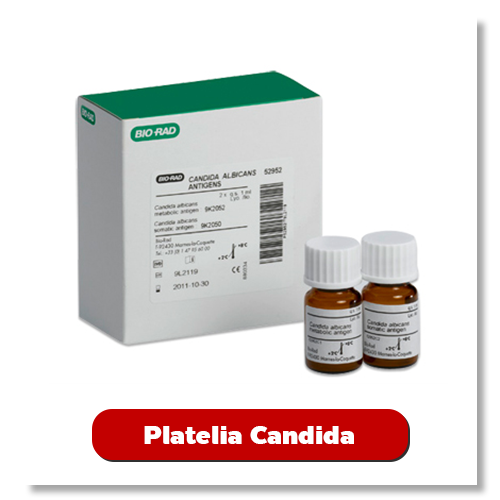
Platelia Candida
Aspergillus species are known to release exo-antigens during growth: low levels of the circulating galactomannan antigen are detected in biological fluids of patients with invasive aspergillosis
The sandwich ELISA Platelia Aspergillus Ag can detect 1ng of galactomanann antigen per ml of serum, enabling the diagnosis of invasive aspergillosis at early stage of the disease often before the onset of clinical signs and radiological abnormalities.
This method is integrated into the EORTC-MSG criteria of definition and classification of invasive aspergillosis.
Platelia Aspergillus Ag assay enables the detection of the circulating Aspergillus galactomannan antigen in adult and pediatric serum samples as well as in adult bronchoalveolar lavage (BAL) fluid samples.
Platelia Aspergillus Ag reagents are ready to use and their formulations comply with the recent international mercury regulations.
Platelia Aspergillus IgG assay is an indirect microplate immuno-enzymatic assay for the detection of anti-Aspergillus IgG antibodies in human serum or plasma.
A unique assay designed with a recombinant purified Aspergillus antigen, this highly sensitive and specific test is anappropriate diagnostic tool for the detection of anti-Aspergillus IgG in immuno-competent patients suffering from variousforms of chronic aspergillosis.

